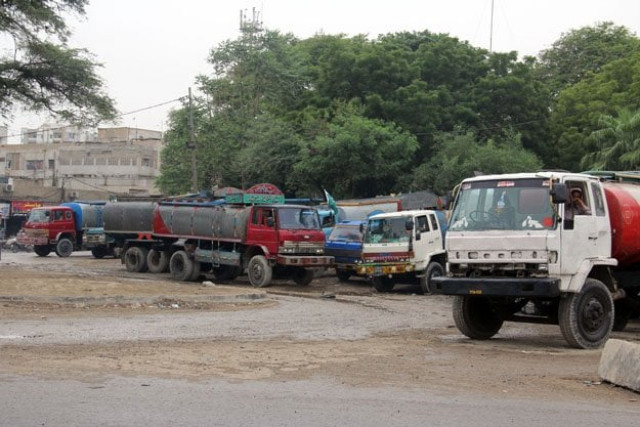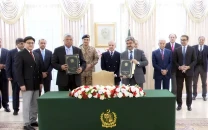Commission comes down hard on KWSB for unregulated hydrants
Judge dismisses petition to lift ban on construction of high-rise, multi-storey buildings

The commission said the lack of regulation of water tankers is negatively affecting people's lives. PHOTO: EXPRESS
Justice Muhammad Iqbal Kalhoro, the Sindh High Court judge who heads the one-man commission, passed this direction after the chairperson of the commission-appointed task force informed the court about the wrongdoings at hydrants in the city.
"Water hydrants are not being run quite methodically. There is a dearth of rules and regulations, which leads to arbitrary decision-making that often results in mismanagement and bad practices," the report submitted by the task force chairperson read.
The commission observed that the report was 'obviously' alarming as it demonstrated that supply from these hydrants was like a blind alley. It added that there were no exact figures about the supply from the hydrants nor were any standard operating procedures being followed in the current mechanism.
Judiciary to adopt zero tolerance policy against corruption
The whole process is dependent on the discretion of the Karachi Water and Sewerage Board (KWSB) management, which has resulted in mismanagement, malpractice and is giving rise to 'hand-made scarcity' of drinking water for the people of this city of over 20 million, it remarked.
Justice Kalhoro expressed his dissatisfaction with the performance of the provincial government on the matter. He said that this issue has been recurring for the past 15 years and the government has not done anything to stop it and save people from being robbed of their basic right.
On the subject of water tankers, the judicial commission observed that they had been operating for the past 16 years unchecked by the authorities and ungoverned by any rules. The court added that the government and authorities were apparently not making any efforts to bring about a change in the system. The commission also observed that people should be given water through water taps in their homes rather than through illegal and expensive water tankers.
The provincial advocate-general told the court that the provincial government had almost completed its process to regulate the hydrants from where these tankers draw water and soon everything will be under the legal net.
Judicial commission orders testing of water supplied to citizens in Sindh
Justice Kalhoro warned that if the concerned authorities did not act in accordance with the Supreme Court directions on the subject and within the stipulated time, notices to all respondents will be issued.
Treatment plants
On the matter of the rehabilitation of the water filtration and sewerage treatment plants TP-I and TP-III, the commission said that the committee, comprising of Local Government Secretary Ramzan Awan, KWSB Managing Director Hashim Raza Zaidi and others, failed to do the job.
Neither were the above-mentioned treatment plants made functional nor were the water filtration plant and laboratory in Gharo rehabilitated, it observed. Such failure on the part of the concerned officials is tantamount to violation of the court’s orders, said the commission.
On the issue of the Right Bank Outfall Drain-II, Justice Kalhoro said that it appears that the federal and provincial governments have still not been able to sort out their differences over starting the construction on remaining part of the canal.
Judiciary, prosecution at tail-end of budgetary allocations of Sindh
He directed the provincial advocate-general and additional attorney-general to apprise the court on the next hearing as to why the commission should not pass an order to start the remaining work immediately.
Meanwhile, the Sindh Industrial Trading Estate managing director informed the court that out of 450 samples of effluent from factories, the reports of 117 had been obtained and of those only 15 were found fit for the environment. He said that the factories found to be involved in releasing toxic effluent and damaging the environment were issued notices.
High-rise buildings
The commission dismissed an application filed by the Association of Builders and Developers pleading to lift the ban on the construction of high-rise and multi-storey buildings in the city, observing that it was not maintainable.
The association had informed the court that the Sindh Building Control Authority had, in compliance with the apex court's directives, imposed a ban on the construction of buildings beyond ground plus two floors.
Water, sanitation given due attention in budget
It had argued that there was no law restricting construction of high-rise projects. It had also maintained that the multi-storey and high-rise buildings were not causing water-related problems. The commission was informed that the ban was hampering commercial activities, as the builders and developers were suffering huge financial losses.
After listening to the arguments, the judge observed the applicants failed to demonstrate that the commission has the mandate or power to alter the course of the SC's direction.
The commission also heard a matter relating to the Sindh Environment Protection Agency, Solid Waste Management Board and others. It, however, observed that in nearly all the matters the concerned officials have not complied with the court's directions. Therefore, it added, they have been issued show-cause notices to explain why not proceedings of wilful contempt of court should not be initiated against them.
The hearing was adjourned till July 1.



















COMMENTS
Comments are moderated and generally will be posted if they are on-topic and not abusive.
For more information, please see our Comments FAQ